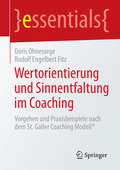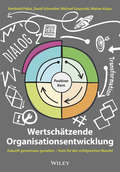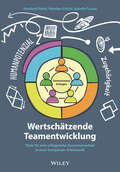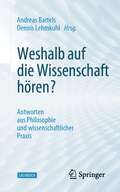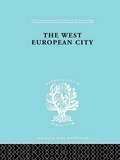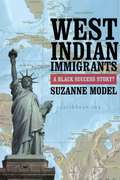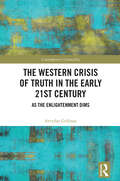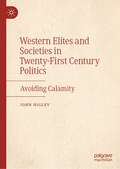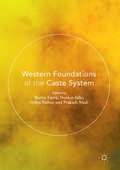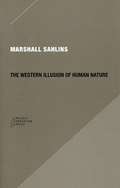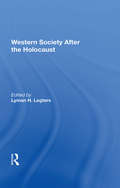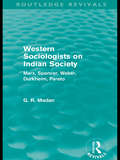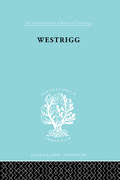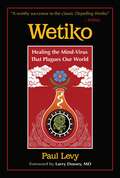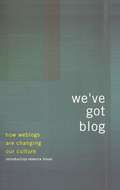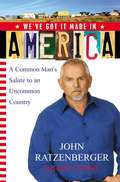- Table View
- List View
Wertebasierte Gesprächsführung: Wirkprinzipien der Personzentrierten Theorie (essentials)
by Christiane HellwigPraxisnah erläutert die Autorin die grundlegenden Begriffe der Personzentrierten Theorie von Carl Rogers und ihre Bedeutung für eine wertebasierte Gesprächsführung. Auf dieser Basis wird die Relevanz der damit verbundenen humanistischen Haltung vermittelt und dargestellt, wie Menschen darin unterstützt werden können, ihrer Motivation auf die Spur zu kommen. Mit Beispielen aus dem Coaching und dem Führungsalltag wird eingängig beschrieben, wie die personzentrierten Wirkprinzipien dazu beitragen, im wörtlichen Sinn selbst-bewusster zu handeln; sie sind Erfolgsfaktoren und das Fundament wertschätzender Kommunikation. Und sie wirken kontextübergreifend: Sie sind Grundlage für Gespräche in psychosozialen genauso wie in wirtschaftlichen Arbeitsfeldern.
Wertorientierung und Sinnentfaltung im Coaching: Vorgehen und Praxisbeispiele nach dem St. Galler Coaching Modell® (essentials)
by Doris Ohnesorge Rudolf Engelbert FitzDoris Ohnesorge und Rudolf E. Fitz positionieren zunächst die These, dass Menschen sich Ziele nicht der Ziele wegen setzen, sondern weil sie Werte vermehren oder Wertverletzungen vermeiden wollen. Aufbauend darauf beschreiben die Autoren, warum und wie Werte im Zusammenhang mit Entwicklungsvorgängen der wesentliche Antrieb für Menschen sind. Diese Wirkung zeigt sich besonders im Kontext Führung, Beratung und Coaching. Werte beinhalten nämlich eine zentrale und starke Dynamik, den Sinn. Erst eine Sinnentfaltung lässt Menschen nicht nur zufrieden, sondern sinnerfüllt leben und arbeiten. Aus dieser Grundüberlegung heraus entstand das St. Galler Coaching Modell®, das auf Werteentwicklung ausgerichtet ist. Ziel der jahrelangen Evaluierung dieses Modells war es, alle entwicklungsrelevanten Elemente in Veränderungsvorgängen zu identifizieren und in ein systemisches und systematisches Modell zu übertragen.
Wertorientierungen und organisationale Werte in Laufbahnen: Eine rekonstruktive Studie in einem Finanzdienstleistungsunternehmen
by Katharina AgostiniKatharina Agostini untersucht in dieser qualitativ-rekonstruktiven Studie die Bedeutsamkeit von Wertorientierungen und organisationalen Werten für das Alltagshandeln von Akteuren und Akteurinnen eines öffentlich-rechtlichen Finanzdienstleistungsunternehmens. Die Autorin setzt verschiedene theoretische Sichtweisen in Bezug zueinander und eröffnet Perspektiven auf handlungspraktische, organisationale sowie geschlechts-, hierarchie- und laufbahnbezogene Aspekte. Die Ergebnisse aus qualitativen Interviews mit Mitarbeitenden und Führungskräften liefern einen wichtigen Beitrag für den Diskurs um die Bedeutung individueller Wertorientierungen sowie organisationaler Werte im Kontext beruflichen Handelns und Erlebens.
Wertorientierungen und Wahlverhalten: Effekte gesellschaftlicher Wertorientierungen bei den Bundestagswahlen 2009 - 2017 (Wahlen und politische Einstellungen)
by L. Constantin WurthmannIn diesem Open-Access-Buch untersucht L. Constantin Wurthmann die sehr enge Beziehung zwischen Wertorientierungen und Wahlverhalten. Obwohl Wertorientierungen und gesellschaftliche Wertorientierungen im Speziellen zu den zentralsten Konzepten empirischer Sozialforschung gehören, wurde ihre Wirkungsweise im Wahlverhalten bisweilen stiefmütterlich behandelt. Die vorliegende Studie entwickelt einen Vorschlag zur konzeptionellen Erfassung gesellschaftlicher Wertorientierungen und deren Einfluss auf das Wahlverhalten der bundesdeutschen Bevölkerung, welcher anschließend mit Daten der German Longitudinal Election Study (GLES) für die Bundestagswahlen 2009, 2013 und 2017 überprüft wird. Dabei lassen sich strukturelle Veränderungen gesellschaftlicher Wertorientierungen in den Wählerschaften deutscher Parteien nachweisen.
Wertschätzende Organisationsentwicklung: Zukunft gemeinsam gestalten - Tools für den erfolgreichen Wandel
by Reinhold Pabst David Schneider Michael Soszynski Marian KujauIn ihrem Buch beschreiben die Autoren die Grundlagen von Organisationsentwicklungsprozessen und Gestaltungsmöglichkeiten. Methodisch basiert das Buch auf dem "Appreciative Inquiry" Ansatz für wertschätzende Organisationsentwicklung. Die angebotenen Werkzeuge zielen auf Lösungsfokussierung und Ressourcenaktivierung bei gleichzeitiger Wertschätzung dessen, was gut funktioniert. Im Buch beschreiben die Autoren zunächst die Grundlagen der Organisationsentwicklung, indem sie wichtige Begriffe kurz erläutern und visualisieren. Außerdem finden sich einige Storytelling-Elemente zur Vermittlung der Inhalte und einen ausgeprägten Serviceteil mit Stimmen aus der Praxis. Weitergehend bringen die vier Autoren, ihre eigene angewandte Erfahrung aus verschiedenen Organisationsentwicklungsprojekten mit ein. Die Organisationsentwicklungsmethode "Appreciative Inquiry (AI)" bzw. Wertschätzende Erkundung ist ein positiver Ansatz für Transformationsprozesse. Er verändert die Blickweise von der Herausforderung oder Problemsituation auf die Lösungsfokussierung und Ressourcenaktivierung. Der 5D-Zyklus von "Appreciative Inquiry" (Define, Discover, Dream, Design, Deliver) gibt die Struktur für die Werkzeuge, die in diesem Buch vorgestellt werden, vor. Für jede der fünf Prozessphasen stellen die vier Autoren ihre erprobten Lieblingstools vor. Sie bieten dem Anwender einen schnellen und unmittelbaren Einstieg in die praktische Umsetzung. Im abschließenden Kapitel bieten die Autoren die Herangehensweisen und Lösungsansätze für verschiedene Anlässe von Organisationsentwicklungsprojekten.
Wertschätzende Teamentwicklung: Tools für eine erfolgreiche Zusammenarbeit in einer komplexen Arbeitswelt
by Reinhold Pabst Mareike Schutt Isabelle TyrasaIn "Wertschätzende Teamentwicklung" beschreiben die Autoren die Grundlagen von Teamentwicklungsprozessen. Die Betonung liegt auf Humanpotenzialen: Das sind Werte, die ein Zusammengehörigkeitsgefühl fördern. Diese sollten vorgelebt und gefördert werden. Weiterhin gilt es, die Interaktion in der Zusammenarbeit zu fördern, den Beziehungsaufbau aktiv zu gestalten und Anreize für eine selbst- und fremdmotivierte Beteiligung zu schaffen. "Wertschätzende Teamentwicklung" stärkt den Zusammenhalt im Team, das Wissensmanagement sowie die Lernkultur. Konzepte und Tools für die Anwendung werden mit inspirierenden Stimmen aus der Praxis ergänzt, um ein möglichst ganzheitliches und praxisnahes Bild auf die Thematik zu werfen. Methodisch werden Anreize gesetzt, lineare Denkpfade zu verlassen und eigene Routinen zu reflektieren. Ziel ist die Gestaltung einer wünschenswerten Zukunft! Dazu müssen relevante Probleme adressiert und selbst eine Haltung entwickelt werden, die die Sinnhaftigkeit von Lösungen hinterfragt. Das Buch basiert auf dem "Appreciative Inquiry"-Ansatz für wertschätzende Organisationsentwicklung sowie auf der konstruktivistischen Annahme, dass jedes menschliche Handeln von Wirklichkeitskonstruktionen gesteuert sei. Das heißt, die Perspektiven bzw. die Blickwinkel, die ein Mensch einnimmt, bestimmen, was er wahrnimmt. Durch die Änderung der Perspektive kann gleichzeitig auch die Problemsituation verändert werden. Die im Buch angebotenen Werkzeuge zielen auf eine Lösungsfokussierung und Ressourcenaktivierung bei gleichzeitiger Wertschätzung von dem, was bereits gut funktioniert.
Wertschöpfung hybrid gestalten: Geschäftsmodellentwicklung und Arbeitsgestaltung in der Digitalisierung (ifaa-Edition)
by ifaa – Institut für angewandte Arbeitswissenschaft e. V.In diesem Open-Access-Buch ist die Digitalisierung von Geschäftsmodellen anhand von Praxisbeispielen beschrieben. Dies umfasst einerseits die Entwicklung digitaler bzw. hybrider Geschäftsmodelle und andererseits die Gestaltung des Umsetzungsprozesses im Unternehmen. Dazu zählen Veränderungen an Strukturen der Aufbau- und Ablauforganisation ebenso wie an Zusammenarbeit, Führung und Kompetenzbedarf. Alle Vorgehensweisen und Lösungen sind anschaulich dargestellt. Damit verbundene Potenziale werden ebenso aufgezeigt wie kritische Erfolgsfaktoren.
Weshalb auf die Wissenschaft hören?: Antworten aus Philosophie und wissenschaftlicher Praxis
by Andreas Bartels Dennis LehmkuhlPandemie und Klimakrise rufen die herausragende Rolle der Wissenschaft und des wissenschaftlichen Wissens für Informierung und Orientierung der Gesellschaft sowie für die Beratung der Politik bei der Ausrichtung praktischer Maßnahmen ins Bewusstsein. In diesem Zusammenhang wird die Frage virulent, weshalb der Wissenschaft diese herausgehobene Rolle zukommt. Dass diese Frage trotz der vielbeschworenen Autorität der Wissenschaft alles andere als trivial ist, zeigt sich daran, dass Wissenschaftsskepsis und Relativierung wissenschaftlicher Resultate bis hin zur Wissenschaftsleugnung Einfluss gewinnen, sobald es um konkrete Fragen der Ausrichtung gesellschaftlichen Handelns an der Wissenschaft geht. Wodurch ist also Vertrauen in die durch die Wissenschaft ermittelten Fakten, die in ihren Modellen entworfenen Szenarien und ihre Ratschläge an Gesellschaft und Politik gerechtfertigt? Weshalb soll man der Wissenschaft in besonderem Maße vertrauen und auf ihren Ratschlag hören?Insgesamt sollen die Beiträge des Buches Aufschluss darüber geben, wodurch die Vertrauenswürdigkeit der Wissenschaft in ihrer modernen Form gerechtfertigt ist und an welche Bedingungen ihre besondere Rolle in der Gesellschaft geknüpft ist. Was kann Wissenschaft für die Gesellschaft leisten und wo liegen die Grenzen ihrer orientierenden Rolle? Was heißt es „auf die Wissenschaft zu hören“ und was sind die Bedingungen dafür, dass Menschen in einer demokratischen Gesellschaft sich wissenschaftliche Erkenntnisse aneignen und sie als Richtschnur für ihr Handeln verwenden?
West African Migrations
by Moj�b�ol� Ol�f�nk� Okome Olufemi VaughanDrawing on the interdisciplinary research projects of scholars from various social science and humanities disciplines, this book explores how African migration to Western countries after the neo-liberal economic reforms of the 1980s transformed West African states and their new transnational populations in Western countries.
West-Bloc Dissident: A Cold War Memoir
by William BlumA highly personal and candid memoir by a former U.S. State Department employee who became a radical dissident in the 1960s and remains active in opposing U.S. imperialism
West European City Ils 179 (International Library of Sociology)
by Robert E DickinsonFirst Published in 1998. Routledge is an imprint of Taylor & Francis, an informa company.
West Germany and the Global Sixties
by Timothy Scott BrownThe anti-authoritarian revolt of the 1960s and 1970s was a watershed in the history of the Federal Republic of Germany. The rebellion of the so-called '68ers' - against cultural conformity and the ideological imperatives of the Cold War; against the American war in Vietnam; in favor of a more open accounting for the crimes of the Nazi era - helped to inspire a dialogue on democratization with profound effects on German society. Timothy Brown examines the unique synthesis of globalizing influences on West Germany to reveal how the presence of Third World students, imported pop culture from America and England and the influence of new political doctrines worldwide all helped to precipitate the revolt. The book explains how the events in West Germany grew out of a new interplay of radical politics and popular culture, even as they drew on principles of direct-democracy, self-organization and self-determination, all still highly relevant in the present day.
West Indian Immigrants: A Black Success Story?
by Suzanne ModelWest Indian immigrants to the United States fare better than native-born African Americans on a wide array of economic measures, including labor force participation, earnings, and occupational prestige. Some researchers argue that the root of this difference lies in differing cultural attitudes toward work, while others maintain that white Americans favor West Indian blacks over African Americans, giving them an edge in the workforce. Still others hold that West Indians who emigrate to this country are more ambitious and talented than those they left behind. In West Indian Immigrants, sociologist Suzanne Model subjects these theories to close historical and empirical scrutiny to unravel the mystery of West Indian success. West Indian Immigrants draws on four decades of national census data, surveys of Caribbean emigrants around the world, and historical records dating back to the emergence of the slave trade. Model debunks the notion that growing up in an all-black society is an advantage by showing that immigrants from racially homogeneous and racially heterogeneous areas have identical economic outcomes. Weighing the evidence for white American favoritism, Model compares West Indian immigrants in New York, Toronto, London, and Amsterdam, and finds that, despite variation in the labor markets and ethnic composition of these cities, Caribbean immigrants in these four cities attain similar levels of economic success. Model also looks at "movers" and "stayers" from Barbados, Jamaica, Trinidad, and Guyana, and finds that emigrants leaving all four countries have more education and hold higher status jobs than those who remain. In this sense, West Indians immigrants are not so different from successful native-born African Americans who have moved within the U.S. to further their careers. Both West Indian immigrants and native-born African-American movers are the "best and the brightest"—they are more literate and hold better jobs than those who stay put. While political debates about the nature of black disadvantage in America have long fixated on West Indians' relatively favorable economic position, this crucial finding reveals a fundamental flaw in the argument that West Indian success is proof of native-born blacks' behavioral shortcomings. Proponents of this viewpoint have overlooked the critical role of immigrant self-selection. West Indian Immigrants is a sweeping historical narrative and definitive empirical analysis that promises to change the way we think about what it means to be a black American. Ultimately, Model shows that West Indians aren't a black success story at all—rather, they are an immigrant success story.
West Indian Immigrants: A Black Success Story?
by Suzanne ModelWest Indian immigrants to the United States fare better than native-born African Americans on a wide array of economic measures, including labor force participation, earnings, and occupational prestige. Some researchers argue that the root of this difference lies in differing cultural attitudes toward work, while others maintain that white Americans favor West Indian blacks over African Americans, giving them an edge in the workforce. Still others hold that West Indians who emigrate to this country are more ambitious and talented than those they left behind. In West Indian Immigrants, sociologist Suzanne Model subjects these theories to close historical and empirical scrutiny to unravel the mystery of West Indian success. West Indian Immigrants draws on four decades of national census data, surveys of Caribbean emigrants around the world, and historical records dating back to the emergence of the slave trade. Model debunks the notion that growing up in an all-black society is an advantage by showing that immigrants from racially homogeneous and racially heterogeneous areas have identical economic outcomes. Weighing the evidence for white American favoritism, Model compares West Indian immigrants in New York, Toronto, London, and Amsterdam, and finds that, despite variation in the labor markets and ethnic composition of these cities, Caribbean immigrants in these four cities attain similar levels of economic success. Model also looks at "movers" and "stayers" from Barbados, Jamaica, Trinidad, and Guyana, and finds that emigrants leaving all four countries have more education and hold higher status jobs than those who remain. In this sense, West Indians immigrants are not so different from successful native-born African Americans who have moved within the U.S. to further their careers. Both West Indian immigrants and native-born African-American movers are the "best and the brightest"—they are more literate and hold better jobs than those who stay put. While political debates about the nature of black disadvantage in America have long fixated on West Indians' relatively favorable economic position, this crucial finding reveals a fundamental flaw in the argument that West Indian success is proof of native-born blacks' behavioral shortcomings. Proponents of this viewpoint have overlooked the critical role of immigrant self-selection. West Indian Immigrants is a sweeping historical narrative and definitive empirical analysis that promises to change the way we think about what it means to be a black American. Ultimately, Model shows that West Indians aren't a black success story at all—rather, they are an immigrant success story.
The Western Crisis of Truth in the Early 21st Century: As the Enlightenment Dims (Contemporary Liminality)
by Arvydas GrišinasThe Western Crisis of Truth in the Early 21st Century explores the symbolic, experiential, and associative side of contemporary political culture, arguing that phenomena such as ‘post-truth’, digitalization, mediatization, propaganda, illiberalism, or populism, far from being curiosities, have in fact come to represent a uniform aspect of political culture – a challenge to the ‘enlightened’, ‘developed’, and ‘progressive’ world that we believed ourselves to be inhabiting.Through analyses of visual and textual material such as internet memes, academic discourse, news articles, videos, and other media, it considers truth-making in the epoch of Russia’s war in Ukraine, Donald Trump, the hyper-rationalist ritualism of managing the COVID-19 pandemic and the shifting realities on the Eastern border of the West, in order to shed light on the transfiguration of the western intellectual tradition by the global political, technological, and intellectual dynamics of a world that is far from approaching the end of history. Asking what is to be done in the face of this new reality, The Western Crisis of Truth in the Early 21st Century considers whether the dissident literature of Central and Eastern Europe, which has already lived through a period of disenlightenment under the Soviet Union, as well as other Eastern European movements of dignity and independence might offer answers.A study of the dimming of the Enlightenment, this volume will appeal to scholars of social and political theory and political anthropology.
Western Elites and Societies in Twenty-First Century Politics: Avoiding Calamity
by John HigleyThis book focuses on threats to the continued viability of Western institutions and practices for which it is not easy to conceive remedies consistent with the Western tradition. Higley argues that structural difficulties in postindustrial societies, particularly the United States, the United Kingdom, France, and elsewhere, threatened troubles that political manipulation by elites might not be sufficient to contain or resolve. Struggling against lethal climate change, politically explosive waves of migrants and refugees, the likelihood of further pandemics, populist nationalism, and destabilizing effects of social media, elites must consider new demographic, economic, social, political, and international policies. Higley offers a powerful and provocative analysis of the elite’s ability to sustain Western societies in their current social and political forms.
Western Foundations of the Caste System
by Martin Fárek, Dunkin Jalki, Sufiya Pathan and Prakash ShahThis book argues that the dominant descriptions of the ‘caste system’ are rooted in the Western Christian experience of India. Thus, caste studies tell us more about the West than about India. It further demonstrates the imperative to move beyond this scholarship in order to generate descriptions of Indian social reality. The dominant descriptions of the ‘caste system’ that we have today are results of originally Christian themes and questions. The authors of this collection show how this hypothesis can be applied beyond South Asia to the diasporic cultures that have made a home in Western countries, and how the inheritance of caste studies as structured by European scholarship impacts on our understanding of contemporary India and the Indians of the diaspora. This collection will be of interest to scholars and students of caste studies, India studies, religion in South Asia, postcolonial studies, history, anthropology and sociology.
The Western Illusion of Human Nature: With Reflections on the Long History of Hierarchy, Equality, and the Sublimation of Anarchy in the West, and Comparative Notes on Other Conceptions of the Human Condition
by Marshall SahlinsReflecting the decline in college courses on Western Civilization, Marshall Sahlins aims to accelerate the trend by reducing "Western Civ" to about two hours. He cites Nietzsche to the effect that deep issues are like cold baths; one should get into and out of them as quickly as possible. The deep issue here is the ancient Western specter of a presocial and antisocial human nature: a supposedly innate self-interest that is represented in our native folklore as the basis or nemesis of cultural order. Yet these Western notions of nature and culture ignore the one truly universal character of human sociality: namely, symbolically constructed kinship relations. Kinsmen are members of one another: they live each other's lives and die each other's deaths. But where the existence of the other is thus incorporated in the being of the self, neither interest, nor agency or even experience is an individual fact, let alone an egoistic disposition. "Sorry, beg your pardon," Sahlins concludes, Western society has been built on a perverse and mistaken idea of human nature.
Western Society After The Holocaust
by Lyman H. LegtersBased on an International Scholars' Symposium convened to recall the infamous Kristallnacht in Hitler's Germany, this book represents an effort to distill from the ensuing Holocaust experience the lessons that seem most applicable to the contemporary world.
Western Sociologists on Indian Society: Marx, Spencer, Weber, Durkheim, Pareto (Routledge Revivals)
by G. R. MadanOf the five major sociologists whose views on Indian society are assessed in this work, originally published in 1979, Marx and Weber made a special study of the subject and had something definite to say about the future of Indian society. Herbert Spencer was primarily concerned with the effects of colonial rule on India’s progress, while Durkheim and Pareto tended to observe Indian society from a comparative point of view. However, as this study shows, all five sociologists touched on two special aspects of Indian society – Indian religion and the caste system. The other features of Indian society which they discussed in their various writings range widely from marriage and family structure, through village communities and the social structure of cities, to political organization, the educational system, economic conditions, and the future progress of Indian society. Dr Madan demonstrates the correctness of Marx’s contention that the political subordination of India was the one great hindrance to the future progress of Indian Society. He points out, though, that Marx failed to see clearly the effects of the caste system on economic development, and shows that this aspect was more correctly assessed by Max Weber. On the other hand, in Dr Madan’s view, Weber’s observation that Indian religion was ‘other-worldly’ and therefore a great obstacle to progress in Indian society lacked incisiveness. By focusing on a neglected aspect of the writings of five of the great figures in sociology, the book gives a new insight into their work, and at the same time highlights many hitherto unrecognized facets of India’s complex social structure.
Westrigg:Soc Cheviot Ils 180 (International Library of Sociology)
by James LittlejohnFirst Published in 1998. Routledge is an imprint of Taylor & Francis, an informa company.
Wetiko: Healing the Mind-Virus That Plagues Our World
by Paul Levy• Explores how wetiko covertly operates both out in the world and within our minds and how it underlies every form of self-destruction, both individual and collective • Reveals how wetiko&’s power lies in our blindness to it and examines how people across the ages have symbolized wetiko to help see it and heal it • Examines the concept of wetiko as it appears in the teachings of the Kabbalah, Hawaiian Kahuna shamanism, mystical Christianity, and the work of C. G. Jung In its Native American meaning, wetiko is an evil cannibalistic spirit that can take over people&’s minds, leading to selfishness, insatiable greed, and consumption as an end in itself, destructively turning our intrinsic creative genius against our own humanity. Revealing the presence of wetiko in our modern world behind every form of destruction our species is carrying out, both individual and collective, Paul Levy shows how this mind-virus is so embedded in our psyches that it is almost undetectable--and it is our blindness to it that gives wetiko its power. Yet, as Levy reveals in striking detail, by recognizing this highly contagious mind parasite, by seeing wetiko, we can break free from its hold and realize the vast creative powers of the human mind. Levy explores how artists, philosophers, and spiritual traditions across the ages have been creatively symbolizing this deadly pathogen of the psyche so as to help us see it and heal it. He examines the concept of wetiko as it appears in the teachings of the Kabbalah, Hawaiian Kahuna shamanism, Buddhism, and mystical Christianity and through esoteric concepts like egregores, demons, counterfeiting spirits, and psychic vampires. He reveals how visionary thinkers such as C. G. Jung, Sri Aurobindo, Philip K. Dick, Colin Wilson, Nicolas Berdyaev, and Rene Girard each point to wetiko in their own unique and creative way. He explores how the projection of the shadow self--scapegoating--is the underlying psychological mechanism fueling wetiko and examines wetiko in the context of the Covid-19 pandemic, showing that we can reframe the pandemic so as to receive the lessons and opportunities embedded in it. Revealing how the power of imagination can cure the wetiko mind-virus, Levy underscores how important it is for each of us to bring forth the creative spirit within us, which helps shed the light of consciousness on wetiko, taking away its power over us while simultaneously empowering ourselves.
We've Got Blog: How Weblogs are Changing our Culture
by John RodzvillaInstantaneous and raw, unedited and uncensored, Weblogs are self-publishing at its best and its worst--occasionally brilliant but often pretentious, sometimes shocking but always fascinating. We've Got Blog is the first book to explore this phenomenon, which has been quickly rising from obscure Webpages to national attention in the Wall Street Journal and USA Today. Weblogs are free, searchable journals of opinions and links updated daily by an individual or a group and they have become some of the hottest Websites. We've Got Blog has pulled together some of the best writing explaining their history, the mavericks who created them, and how they are changing the way we use the Internet.
We've Got It Made in America: A Common Man's Salute to an Uncommon Country
by John Ratzenberger Joel EngelEssays on America by the "Cheers" star
WFH (Working From Home): How to build a career you love when you're not in the office
by Harriet Minter'Harriet Minter offers a one-stop resource for those working from home or those who want to work from home but are still sceptical.' - The Financial Times' . . . a must-read for post-Covid times.' - People Management MagazineThe no bullsh*t guide to getting your work and life on track in the new flexible workplace.Virtually every industry is making lasting changes that will open doors to a more flexible working week. So how do we adjust, thrive and excel in an environment where glitchy daily video conferences are the norm?By turns fierce, funny and highly practical, Harriet Minter will show you the skills to be effective and creative during the day-to-day. Harriet breaks down how to be an inspiring and energising manager (either remotely or to a flexibly working team), how to create and thrive in a high-trust culture (on a small and large scale) and most importantly how to achieve your ambition and propel your career forwards.Packed full of hard-won tricks, tips and tools, Harriet Minter draws on her own experience as a careers coach and adviser to companies on their flexible working culture to help you bring your best self to work - from your living room.

